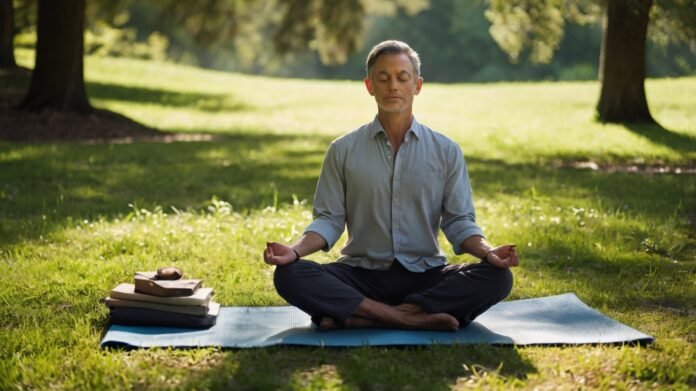In this fast-social world, stress has already figured out among a number of individuals. These concerns may arise from professional deadlines and personal obligations, which can build up overwhelming pressure. Stress does not only affect mental health but also bodies, as headaches, high pressure, and even sleepless nights are examples of symptoms that can arise from stress. However, it can be possible to take effective routines for relieving stress that will lead to significant improvements in health and the ability to take control of one’s life. Stress-relief routines are not a one-off thing that you do; they are practices you incorporate into every day of your life for long-term benefits.
Through this guide, practical yet effective stress-relief routines that you will practice in your everyday life will benefit your overall health. Before we begin, we will explore the reasons for stress management and some effective techniques to deal with it.
Importance of Stress-Relief Routines in Wellbeing
Stress-relief routines are important because unmanageable stress can cause numbers of long-term problems. When you are under prolonged stress, the body ends up being immunocompromised, thus susceptible to diseases and illnesses. It may lead one into chronic cases like heart attacks, diabetes, and anxiety disorders. In other words, managing stress isn’t about just feeling better at the surface; it needs to be much more all-encompassing.
Once stress is managed effectively, mood, energy, and even relationships will improve, making it easier to concentrate on things or make decisions that affect how life is enjoyed. By incorporating a stress-relief routines into your daily life, you can create a healthier environment for both body and mind. The great news is that they do not have to be complex. These small, everyday stress-relief routines can add up to a big difference in your health.
Connection Between Stress and Wellbeing
This is directly linked to the ability to manage one’s stress levels. The more stress one takes on, the more one tends towards things like burnout, exhaustion, and lack of productivity. On the contrary, as opposed to when stress is held in control, a person is more inclined to feel energized, motivated, and emotionally balanced. The two most critical outcomes of effective efforts in managing stress are mental clarity and emotional stability.

Reduction in stress enables the provision of a clearer and more relaxed state in approaching problems that will lead to much better decision-making and problem-solving. Wellbeing is certainly, not just the absence of disease-it-is actually a state far beyond that, and stress-relief practices are vital for nurturing this condition.
Daily Exercise: Stress-Relief Routines for Mental and Physical Wellbeing
Among the best and easiest ways of relieving stress is through physical exercise. Endorphins, or feel-good hormones, are synthesized by the body due to exercise. These are capable of fighting with the stressful mood by increasing it. You don’t have to spend all your available hours in the gym; a walk even of 30 minutes daily can do magic.
Regular Physical Activities boost moods and really can help in decreasing pressure and further prevent improvement of immune deficiency. The well-researched summary on exercise and mental health from Harvard Health states that exercise is one of the best possible answers to mental health issues-you can become totally absorbed in it, forgetting entirely those things in life that cause you stress, be it a morning jog, yoga in the afternoon, or evening bike riding. Find out what it is that really makes you tick, then just make it part of your day-to-day activities.
In addition to those, gym exercises also benefit your self-esteem and body image, thereby further alleviating stress. The more good you feel about yourself physically, the more mentally able you will be to stand the pressures of life.
Mindfulness and Meditation: Essential Stress-Relief Techniques
Mindfulness and meditation act as one’s magic pill for being freed from stress. These practices teach you to take your attention away from focusing on the future or worrying about the past and to bring it right here in the present moment. And with regular practice of mindfulness and meditation, the result would, of course, be reduced anxiety, better focus, and improved emotional regulation.
For starters, you need to sit comfortably in an area that is really quiet without distractions. Now shut your eyes and breathe in and focus your attention on your breathing. Just let go of the racing thoughts and just concentrate on the rhythm of your breath. Even 5 to 10 minutes a day spent doing mindfulness practice can significantly change stress levels.

Mindfulness can also be practiced while engaging in ordinary activities-walking or eating. Such as when eating, so you are fully aware of what you are doing, creating a sense of calm and presence with the action, which naturally reduces stress. The aim is not to eliminate stresses but instead learn healthier ways of responding to it.
Prioritizing Sleep as a Key Stress-Relief Routines
A good night sleep serves as weapon against stress and hugely boosts wellbeing effects. When you do not sleep enough, there will be greater vulnerability of your body to stress.Lack of good sleep only generates stress hormones such as cortisol. The American Psychological Association, on the other hand, claims about the worsening effects of sleep deprivation on stress.
There should be an effort to design a routine for the night so that the quality of sleep is enhanced. Make the atmosphere in the bedroom as cool and quiet as possible, while eliminating distractions. No more screens shall be had at least one hour before bedtime, as the blue light emitted from devices hampers the body’s ability to naturally cycle in and out of sleep. And then totally engage them into relaxing activities like reading, stretching, or breathing exercises that assist the body in preparing for sleep.
Have between 7-9 hours of sleep every night, and get into the habit of going to bed and waking up within the same time every day. Sleeping well restores not only your flesh but your mind as well, empowering the ability to withstand blows from stress during the day.
Connecting with Nature: A Natural Stress-Relief Routines
Another effective way to relieve stress is to spend some time outdoors, connecting with nature and its calming effects. Nature calms the mind and body, thereby lowering the levels of hormones associated with stress and boosting one’s mood. It could be a brief stroll in a park, sitting by a lake, or hiking through a forest-brought almost into nature, and it allows disconnection from daily pressures.
It has been established by research that even the short bursts in nature have been beneficial in alleviating anxiety and depression. Bird songs, trees, and fresh air all are sounds within sights and scents which lower stress levels. For all those souls living in big busy city areas, they can hunt for potential green spaces nearby or make an effort to reach the outside on weekends.
It keeps you balanced between the fast-paced life and the slower, ground-lying one that nature gives. You could practice mindfulness while in nature, too, absorbing the sounds, smells, and sights around you to have that calming effect.
Deep Breathing: An Instant Stress-Relief Technique
Deep breathing exercises can work like magic when you feel overwhelmed. It brings down the heart rate and lowers blood pressure to make you feel light and relaxed. You can do this simple activity whenever and wherever you want, whether at work, home, or in a stressful situation.

Deep Breaths: Sit comfortably with your eyes closed. Inhale through your nose for a count of four. Hold it for a count of four, and then exhale through your mouth for another count of four. Do this several times until you start to feel calmer.
The very nice thing about deep breathing is that it does not require any special equipment. It can actually be done at any time. It is a terrific weapon in the stress-relief arsenal for when some quick anxiety relief or tension relief is needed.
Self-Care: A Crucial Part of Stress-Relief Routines
Self-care isn’t just pampering-it’s about putting one’s own well-being front and center. The more you take care of yourself, the better you can hold the endurance to stress and challenges in life. Self-care means different things, from taking a soothing bath to curling up with your favorite book; it brings you happiness and relaxation.
Make sure a certain segment of your week is reserved solely for self-care activities as part of your stress-relief routines. Maybe it’s taking half an hour to indulge in a hobby, preparing a healthy dish, or simply lying down for a nap. Make it a habit to devote some space in the day to yourself and nurture that self-importance inside. When you nurture yourself, it’s laying a firm foundation for really managing effective ways of coping with stress at work and your whole life.
Social Connections and Support Systems
Human interactions carry a very critical role in stress management. Spending time together with family, friends, and loved ones, generally serves to help in providing emotional support, thus releasing stress. Even one simple conversation may help one feel much understood and less alone in their struggles.
Make it a point to connect with someone regularly, whether through a phone call, video chat, or in-person meetup. Social support may provide the needed resistance against stress and give you the strength to face challenges head-on. It is also important to build an uplifting and encouraging support network around you.
Limiting Screen Time for Effective Stress Management
In the digital age today, with a phone, computer, or TV, it’s quite easy to spend hours glued to the screen. However, the amount of screen time may cause stress and anxiety. The bombardment of constant notifications and keeping up with social media sometimes leaves the mind little space for relaxation.

A good part of your stress-relief practices would actually involve setting us boundaries beyond screen time. It is advisable to unplug for at least an hour every day, preferably before bedtime. Instead of moths on social media, find something to do away from the screen-boring, draw, or even go outside. This really helps you recover focus as well as reducing the mental clutter that makes the person feel more grounded and relaxed.
Gratitude: A Stress-Relief Routines to Shift Your Mindset
Most powerful stress-reliever is gratitude. Instead of worried, triggered, upset, anxious, or frustrated, direct your mental energy towards what you’re grateful for- positivity and appreciation. Each day, you should devote a few minutes to thinking about at least three things for which you are thankful. They can be simple: a fantastic meal, a supporting friend, or a pleasant walk in the park.
It also serves as a part of reinforcement in making that feeling more intense because writing the things he is thankful for in his gratitude journals will not just suffice. The more he indulges into gratitude practice, the less stress will bother him. Gratitude opens one’s eyes toward the brighter side of life, even when things seem to fall apart.
Conclusion
As for every other thing in life,such as marriage or having a child, incorporating stress management techniques in your day to day life should be employed in order to make your life better. Whether through exercise, meditation, yoga or just quality air intake in deep breathing, these principles are all effective in fighting stress and managing it. It is of great importance to note, though, that although life’s stress built around most life events, it does not need to dictate everyone’s. Regular practice of refocusing techniques will make a remarkable change in mental and bodily wellness.
Take one or two of the stress-relief routines and start incorporating them into your day. Gradually increase numbers until they all feel like they are part of the routine. Soon enough, you will enjoy a more balanced and stress-free lifestyle where worries will not knock over your life.
Read more about Essential Daily Habits for Peak Productivity
Frequently Asked Questions
1. What are the pressures of health effects?
Stress affects the brain and body both. It can cause headaches, hypertension at its worst and sleepless nights. With time, and now when stress becomes chronic, immunity decreases, making one susceptible to serious, chronic diseases such as heart disease, diabetes, and anxiety disorders.
2. What are the reasons behind daily stress-relief routines?
Daily stress-relief routines will deal with levels of stress, improving mood, energy, and relationships. Regular practice preparations tend to produce a healthier environment for both body and mind, designing to keep chronic health problems from occurring in the future while improving lifetime wellness.
3. What are the examples of an effective stress-relief technique?
Regular exercise, mindfulness and meditation, prioritization of sleep, getting connected with nature, deep breathing exercises, self-care activities, maintaining social ties, limited screen time, and gratitude are efficient stress relief techniques.
4. How can I start doing a stress-relief routines?
Choose the stress relief technique that speaks to you – one or two- for example, daily walks or meditation. Gradually include more routines until they become a part of your daily ritual, leaving you with a balanced life, stress-free.
Read more about Mastering a Productive Morning Routine in Life

